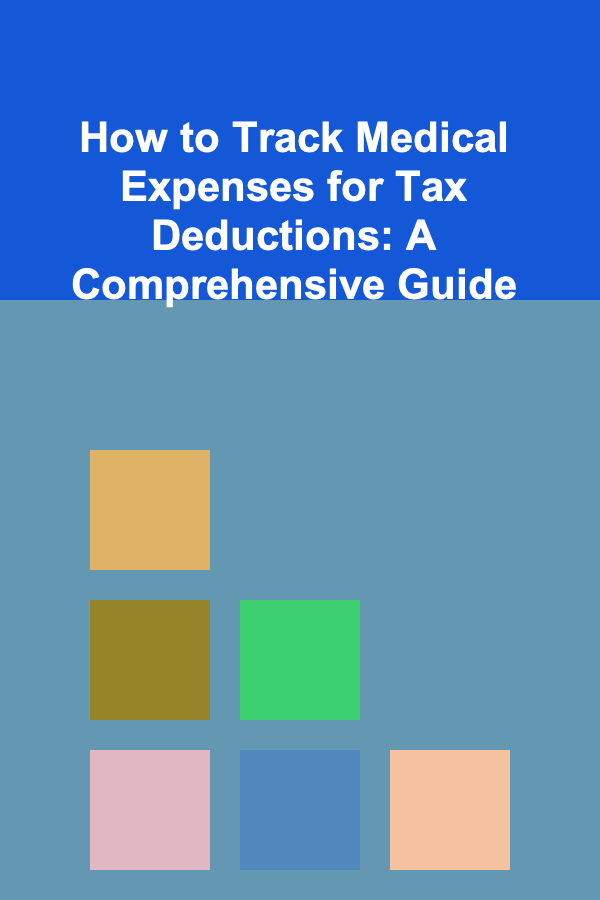
How to Track Medical Expenses for Tax Deductions: A Comprehensive Guide
ebook include PDF & Audio bundle (Micro Guide)
$12.99$6.99
Limited Time Offer! Order within the next:

Tracking medical expenses for tax deductions is a crucial aspect of financial management, especially for those who face substantial healthcare costs. While many people know that medical expenses can be deducted from taxes, the process can seem complicated. With careful tracking and organization, however, taxpayers can take full advantage of these deductions, potentially saving a significant amount of money.
This comprehensive guide will walk you through the ins and outs of tracking medical expenses for tax deductions, focusing on the eligibility requirements, methods for record-keeping, and strategies for maximizing your tax savings.
Understanding Medical Expense Deductions
1.1 What Are Medical Expenses?
Medical expenses for tax purposes include the costs of diagnosing, curing, mitigating, treating, or preventing disease, and the costs of treatments affecting any part or function of the body. These expenses can be related to a wide variety of health-related issues and treatments, such as:
- Doctor's visits
- Prescription medications
- Hospital stays
- Health insurance premiums
- Physical therapy
- Dental and vision care
- Long-term care services
- Medical equipment (e.g., wheelchairs, hearing aids)
The Internal Revenue Service (IRS) allows taxpayers to deduct a portion of their medical expenses if they exceed a certain threshold.
1.2 Eligibility for Medical Expense Deductions
To qualify for the medical expense deduction, the taxpayer must meet specific requirements set by the IRS:
- Itemizing Deductions: You must itemize your deductions on Schedule A of IRS Form 1040 to claim medical expenses. If you opt for the standard deduction, you cannot claim medical expenses.
- Expense Threshold: For tax year 2023, medical expenses are deductible only if they exceed 7.5% of your adjusted gross income (AGI). For example, if your AGI is $50,000, you can only deduct medical expenses that total more than $3,750.
- Qualified Expenses: Only expenses that are deemed "necessary and ordinary" for medical care are eligible. Expenses related to cosmetic procedures or general wellness (such as gym memberships) are not eligible for deduction.
Tracking Medical Expenses for Tax Deductions
2.1 Keep Detailed Records
The most important step in tracking medical expenses is maintaining detailed and accurate records. Every eligible medical expense should be documented, including receipts, statements, and any other supporting information.
- Receipts and Invoices: Keep receipts for all medical payments, including visits to doctors, prescriptions, and other medical services. The receipts should include the date of service, the amount paid, the provider's name, and a description of the service.
- Insurance Statements: Track any reimbursements or payments made by your health insurance. If your insurance provider paid part of a bill, only the amount you personally paid out-of-pocket is eligible for deduction.
- Medical Expense Log: Maintain a medical expense log where you can record the details of each medical cost. Include the date of the expense, the amount, the provider, and the purpose of the expense. This log should be updated regularly.
- Electronic Records: Digital receipts or bank statements can be kept in a secure, organized format. Many tax software programs allow you to scan or upload digital receipts for easy reference.
2.2 Categorizing Medical Expenses
Organize your medical expenses into categories to make tracking easier and more efficient. Common categories include:
- Doctor and Hospital Visits: Include charges from doctors, specialists, clinics, and hospitals. Ensure that you have detailed invoices for these visits.
- Prescription Medications: Keep track of prescriptions, including over-the-counter medications that are prescribed by your doctor.
- Health Insurance Premiums: If you pay for health insurance premiums out-of-pocket, these costs are deductible. This includes premiums for both individual and family plans.
- Dental and Vision Care: Dental expenses like cleanings, fillings, and orthodontic treatments, as well as vision care such as eye exams and glasses, qualify for tax deductions.
- Transportation Costs: If you need to travel for medical care, you may deduct transportation costs. Keep a log of mileage driven to medical appointments or keep receipts for public transportation costs.
2.3 Using Tax Software for Record-Keeping
Using tax software can simplify the process of tracking medical expenses and help ensure you don't miss out on potential deductions. Many tax software programs offer features like expense tracking, receipt scanning, and automatic categorization of medical expenses.
Some popular tax software platforms include:
- TurboTax
- H&R Block
- TaxSlayer
- TaxAct
These platforms also offer guidance on the eligibility of different expenses and help with calculating the total deductible amount.
Maximizing Your Medical Expense Deductions
3.1 Bundle Medical Expenses
If your medical expenses are close to the 7.5% threshold, consider bundling eligible expenses into one year. For example, if you have a procedure or treatment that can be scheduled in a later year, consider rescheduling it to accelerate your deductions for the current tax year.
- Timing Expenses: If you are close to the threshold, consider scheduling elective procedures or medical treatments that may be necessary but not urgent before the end of the tax year to maximize your deductions.
3.2 Include Over-the-Counter Products and Services
While some over-the-counter products are not deductible, others may be if they are medically necessary. For example:
- Prescription Glasses or Contacts: These can be deductible as part of vision care.
- Medically Necessary Equipment: If you require items like hearing aids, crutches, or oxygen equipment, keep a record of those expenses.
- Weight Loss Programs: If recommended by a doctor for medical purposes (such as treating obesity), some weight loss programs may be deductible.
3.3 Long-Term Care Services
If you or a dependent receive long-term care services, the costs may be deductible under certain conditions. This includes expenses for nursing homes or in-home care. Ensure that these costs are medically necessary and that you document all related services and costs.
3.4 In-Home Modifications
Certain home modifications made for medical purposes, such as installing wheelchair ramps or modifying bathrooms for accessibility, may qualify as medical expenses. Ensure that the modification is deemed medically necessary by a physician to qualify for the deduction.
Understanding Common Medical Expenses That Are Not Deductible
While many medical expenses qualify for deductions, there are some that do not. Understanding what is not deductible can help prevent confusion during the tax filing process:
- Cosmetic Procedures: Expenses related to cosmetic surgery or procedures for appearance improvement, such as Botox or facelifts, are not deductible unless they are deemed medically necessary.
- General Wellness Programs: Programs like gym memberships, fitness classes, or yoga sessions are not deductible unless they are part of a specific treatment plan recommended by a doctor.
- Non-Medical Travel: Travel expenses related to vacation or non-medical trips cannot be deducted, even if they include some healthcare treatments.
Conclusion
Tracking medical expenses for tax deductions requires careful organization and attention to detail. By maintaining thorough records, categorizing your expenses, and using tax software, you can maximize your tax savings and reduce your taxable income. Be sure to stay informed about the IRS rules for medical expense deductions, as they may change year to year. With the right strategies, you can take full advantage of the medical expense deduction and potentially lower your overall tax liability.
Whether you're dealing with chronic health issues or simply want to plan ahead, tracking your medical expenses is an essential part of financial management. Keep accurate records, stay proactive, and consult with a tax professional if necessary to ensure you're making the most of available tax benefits.
Reading More From Our Other Websites
- [Home Security 101] How to Protect Your Home During Vacations or Long Trips
- [Organization Tip 101] How to Keep Track of Important Deadlines with Document Management
- [Home Budget 101] How to Create a Family Budget That Automates Savings and Works for Everyone
- [Personal Finance Management 101] How to Manage Money as a Couple Without Arguments
- [Survival Kit 101] Best Survival Kit for Marine Biologists Conducting Offshore Research
- [Organization Tip 101] How to Use Floating Shelves for Stylish Bathroom Storage
- [Personal Care Tips 101] How to Perfect Your Oral Hygiene Routine for a Bright Smile
- [Personal Finance Management 101] How to Manage Finances for a Growing Family
- [Needle Felting Tip 101] The Ultimate Needle Felting Animals Guide: From Beginner to Masterpiece
- [Home Security 101] How to Perform a Home Security Audit to Identify Weak Spots
Building a Digital Budget Tracker: A Comprehensive Guide
Read More
How to Develop a Feedback System for Continuous Improvement
Read More
How to Develop a Morning Meditation Routine Checklist
Read More
How to Monetize Deep Learning Models in the E-commerce Space
Read More
How to Track Weekly Spending Using a Spreadsheet (Excel/Google Sheets)
Read More
10 Tips for Creating a Minimalist Grocery List
Read MoreOther Products
Building a Digital Budget Tracker: A Comprehensive Guide
Read More
How to Develop a Feedback System for Continuous Improvement
Read More
How to Develop a Morning Meditation Routine Checklist
Read More
How to Monetize Deep Learning Models in the E-commerce Space
Read More
How to Track Weekly Spending Using a Spreadsheet (Excel/Google Sheets)
Read More